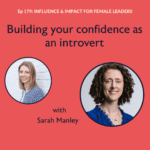Workplaces and meetings are not set up to get the best out of introverts so it’s no wonder that many people who identify as introverts can experience self doubt at work even in leadership roles.
Sarah Manley built a highly successful career in marketing as a deep introvert but was growing tired of being ‘always on’ and visible and increasingly felt like she was in the wrong place. It ate at her confidence. Then she discovered ‘Quiet’; by Susan Cain and she understood herself and her strengths fully for the first time. Sarah approached work with a new mindset and embraced being an introvert at work. In her book ‘The Quiet Catalyst’ Sarah shares her insights, tools and strategies to thriving as an introvert at work.
In our conversation we discuss…
-
How to network successfully as an introvert
-
How to navigate working with an extraverted manager
-
How to gather feedback that works for you as an introvert and how to make it useful
-
Why energy management is so important for introverts and Sarah’s tools for managing your energy effectively
-
Top tips for presentations
My name’s Carla Miller, leadership coach, author and trainer. And this is the Influence & Impact podcast for women leaders, helping you confidently navigate the ups and downs of leadership and feel less alone on your journey as a leader. In fortnightly episodes I share practical tools and insights from myself and my brilliant guests that will help you succeed in your career.
Sponsor my 50th birthday Great North Run to find a cure for diabetes
FREE RESOURCE – How To Say No Challenge:
If you struggle to say ‘no’ then this free 5 day challenge is for you. You’ll receive a short email each day containing a short video taking you through the 5 steps of my How To Say No framework. We’ll get you happily saying no in just 5 days!
Join the May cohort of Influence & Impact to learn how to tackle self-doubt, increase your impact and become brilliant at influencing. It’s a small cohort working closely with me and includes 6 workshops and 2 peer coaching sessions.
My Be Bolder 4 week confidence and assertiveness course will be running again in February. In it we cover:
⭐ Tackling imposter feelings and self-doubt
⭐ Mastering your mindset
⭐ Courageous conversations
⭐ Speaking up
About Sarah Manley:
Sarah Manley, an Amazon #1 bestselling author, career coach, mentor and speaker draws on two decades of international corporate experience. As the founder of The Quiet Catalyst, she helps introverted professionals unlock their potential by offering tailored guidance for navigating corporate life with confidence and energy.
Find out more about Sarah:
